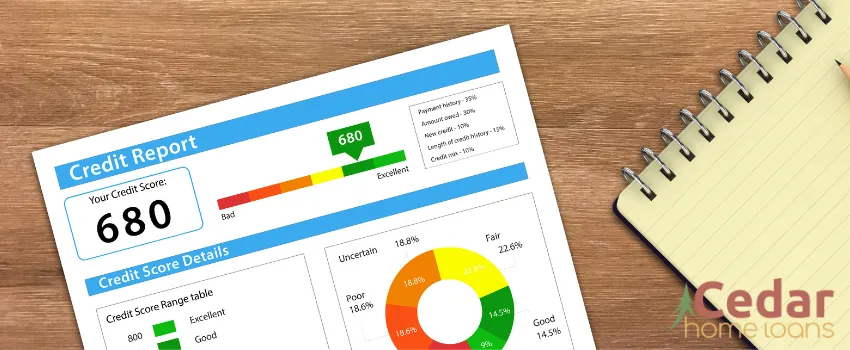Mortgage loans are fundamental for homeownership since they provide the finances required to purchase a property. They provide capital, making homeownership more affordable by spreading payments over extended periods. Individuals can use mortgage loans to develop equity, gain from property appreciation, and take advantage of tax breaks.
Owning a home provides security, allows you to personalize it, and acts as a long-term investment. Borrowers must, however, meet their financial commitments and bear the costs of repayment, property taxes, insurance, and maintenance. Read below if you want to know what is needed to qualify for a mortgage loan.
What Are the Four Things You Need to Qualify for a Mortgage?
Qualifying for a mortgage loan requires preparing several mortgage loan requirements to increase your chances of approval. You should focus on four key factors: credit score, income and employment, debt-to-income ratio, and down payment.
Each of these factors contributes to your overall financial profile and affects your eligibility for a mortgage.
1. Credit Score
One of the most important mortgage loan requirements taken into account by lenders when evaluating loan applications is the applicant’s credit score. A credit score is a numerical indication of their creditworthiness based on their credit history. Lenders use credit scores to determine the risk involved in making a loan to a borrower. A higher credit score denotes appropriate credit usage and a decreased risk of a loan payment default.
2. Income and Employment
When considering how to qualify for a mortgage loan, you should assess your income and employment history. Mortgage lenders closely examine these factors to determine your eligibility for a mortgage. Providing proof of employment and submitting income documentation are key qualifications for mortgage loan.
It’s critical to understand that when lenders evaluate your income for a mortgage loan, they take into account more than simply your wage. They consider several additional reliable and consistent sources of income, which might improve your overall revenue profile. These additional sources of income could be:
-
Military compensation: Lenders usually count any military compensation, such as housing or subsistence allowances, as part of their gross income.
-
Revenue from a side business: Lenders may consider this additional revenue as a complement to their primary income if they have a secondary source of income from a side job.
-
Payments for alimony or child support: These may be considered by lenders when determining your income if they are regular, court-ordered payments anticipated to last for a considerable amount of time.
-
Commissions and bonuses: If you receive commissions or periodic bonuses as part of your compensation, lenders may consider these part of your income, mainly if they are consistent and trustworthy.
-
Overtime money: If you earn overtime pay regularly, lenders may consider it when assessing your overall income. They often favor a track record of consistent overtime hours over one-time or infrequent overtime compensation.
-
Income from investment accounts: Lenders may include income from investment accounts, such as dividends, interest, or rental properties, as part of their total income.
-
Social Security payments: If you get social security payments, lenders may consider them part of your income, especially if they are consistent and periodic.
3. Debt-To-Income Ratio
Along with their income, a buyer’s financial behavior is one of the most vital factors and mortgage loan qualifications that lenders observe.
Qualifying for a mortgage loan also means you must have an impressive debt-to-income ratio (DTI), which compares your monthly debt payments to your total monthly revenue. This ratio informs lenders about your ability to handle debt and make mortgage payments on schedule.
Lenders add up all of your monthly debt commitments to determine your DTI. These commitments include credit card payments, student loan payments, auto loan payments, personal loan payments, and any other outstanding debts. They then take your gross monthly income, which is the amount you make before taxes and deductions, and divide it by this sum.
If you’re wondering how to qualify for a mortgage loan with your DTI, remember that most lenders generally desire a DTI ratio of 43% or less. As a result, the total amount of your monthly loan payments shouldn’t be higher than 43% of your gross monthly income. For instance, your total loan payments should ideally not exceed $2,150 ($5,000 x 0.43) if your gross monthly income is $5,000.
4. Down Payment
Qualifying for a mortgage loan means you should have enough money to settle the down payment. If you want better chances at qualifying for a mortgage loan, saving up for a larger down payment is better because this lessens the amount your lender needs to loan you. Doing this makes you less risky and a more appealing candidate.
How Can I Increase My Chances of Getting a Mortgage?
After learning how to qualify for a mortgage loan, the next step is increasing your chances of getting approval. Here’s how you can do it:
-
Focus on improving your credit score by paying bills on time and reducing debts.
-
Aim for a stable employment history and consistent income, as this demonstrates financial reliability.
-
Get a cosigner with a strong credit history and stable income that can also help strengthen your application.
-
Maintain a good credit profile by checking for errors and avoiding significant credit changes.
These actions can enhance your eligibility and improve your chances of getting approved for a mortgage loan.
What Are the Most Important Factors in Getting a Mortgage?
Aside from meeting the mortgage loan requirements established by lenders, other important factors can improve your mortgage loan qualifications, including:
1. Assets
When applying for a home loan, your lender must have faith in your ability to make payments despite facing a financial emergency. This is where your assets come into play.
Assets are expensive goods you own that can be used as a source of income. They come in a variety of forms, such as:
-
Checking and savings accounts. These liquid assets show your ability to make mortgage payments and maintain a stable financial situation.
-
Certificates of deposit (CDs). CDs are time deposits with a fixed period and interest rate that can be used as extra cash reserves.
-
Stocks, bonds, and mutual funds. These demonstrate your potential for capital growth and access to extra financial resources.
-
IRAs, 401(k)s, and other retirement accounts. Since they represent long-term financial security and a source of funds in case of emergency, lenders may view these retirement resources as assets.
Your lender may seek documents, such as bank statements or financial institution records, to confirm the existence and value of these assets. This documentation assures the lender that you have additional funds to fall back on in unforeseen situations.
2. Property Type
Along with the other mortgage loan requirements, the property you intend to buy influences your capacity to receive a loan. A primary residence, or a home you want to live in for the bulk of the year, is the most straightforward property type to finance.
Lenders consider primary residences to be less hazardous investments, making it easier for them to lend to a broader spectrum of people. One reason is that homeowners will prioritize mortgage payments even in financial difficulties because it directly impacts where they live.
If you want to buy a secondary property, such as a holiday home or an investment property, the lending conditions become more stringent. Lenders set stricter credit score requirements, want more significant down payments, and expect lower debt levels. Secondary properties constitute a higher risk to lenders because they are luxury items or speculative investments.
3. Loan Type
Loan types can significantly affect the process of getting a mortgage. Different loan types, such as conventional, FHA, VA, or USDA loans, have varying mortgage loan requirements, down payment amounts, and interest rates.
You must understand the pros and cons of each loan type and choose the one that best suits your financial situation and goals. Consulting with a mortgage professional can help you navigate the various loan options and select the most suitable one for your needs.
How Far in Advance Should You Apply for a Mortgage?
Applying for a mortgage several months in advance is highly recommended before you buy a home. Doing so allows enough time to prepare the proper qualifications for mortgage loan.
Applying in advance also gives more room for the mortgage process, including gathering necessary documents, completing paperwork, and undergoing approval. Finally, it gives you more time to address any issues and increases the likelihood of securing a mortgage with favorable terms.
Key Takeaway
As an aspiring homeowner, you may wonder, “What do you need to qualify for a mortgage loan?” In general, you will need to focus on improving four specific factors: your credit score, income and employment, debt-to-income ratio, and down payment.
In addition, qualifying for a mortgage loan entails assessing your chances for approval. This can be achieved through several adjustments and improvements in your financial and spending habits. Moreover, you should also consider other significant factors like assets, property type, and loan type when getting a mortgage loan, as these contribute to the process. It also helps to apply months in advance to prepare for all requirements.
Experience low-interest and hassle-free mortgage loans from Cedar Home Loans.
As a dependable Colorado mortgage company, Cedar Home Loans can help you enjoy the advantages of a low-interest and hassle-free mortgage loan. Our team of professionals will help you through the process, whether you’re a first-time home buyer or looking to refinance.
With our affordable rates, flexible terms, and tailored service, we’ll help you get the financing you need to achieve your dream of becoming a homeowner. Contact us today to experience the benefits of working with a top Colorado mortgage provider.





